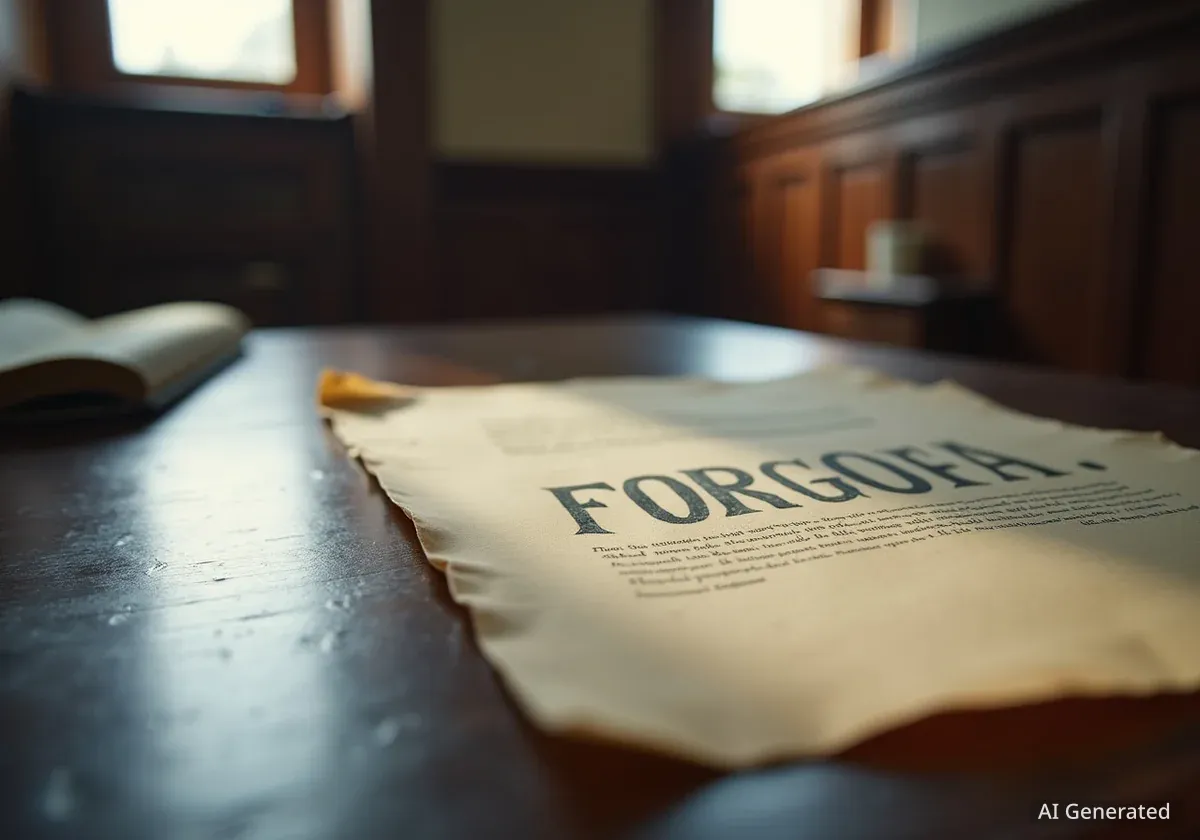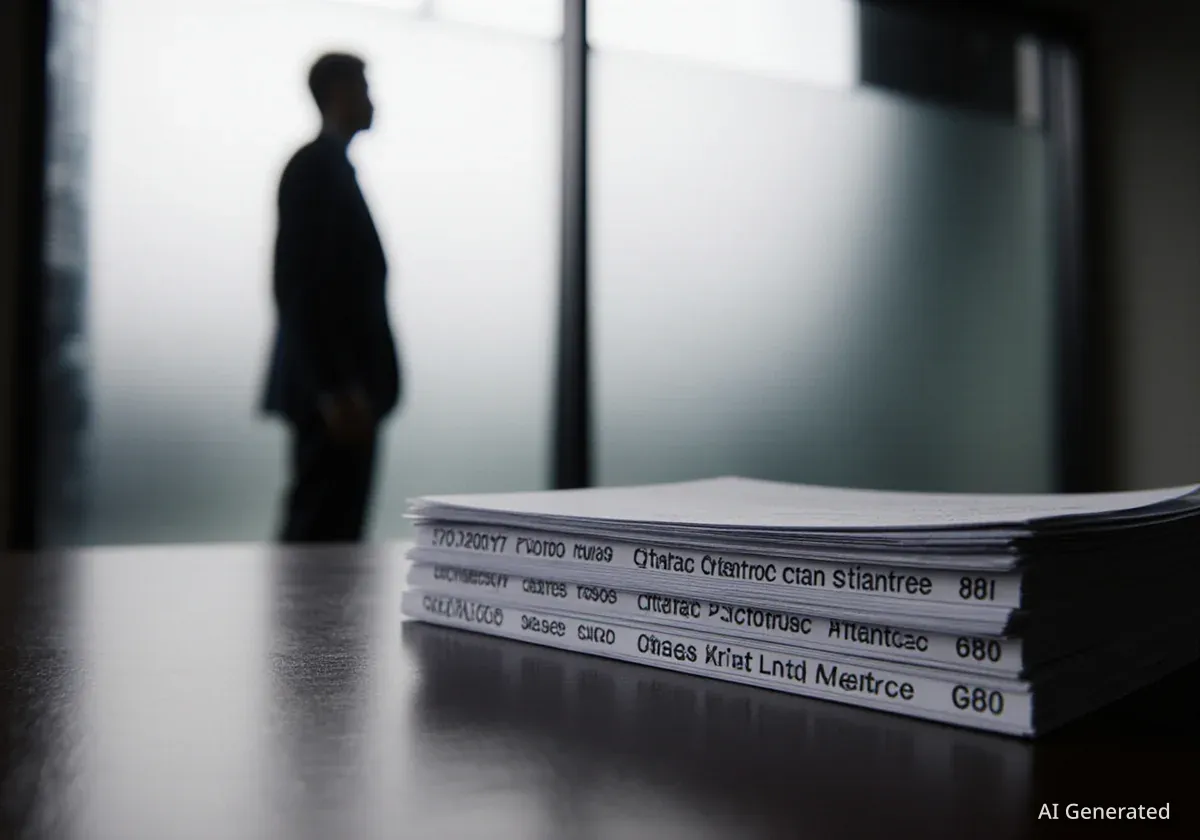A former real estate agent from Rockland County has pleaded guilty to forging a homeowner's signature to illegally take ownership of her property. New York Attorney General Letitia James announced that Oscar Dais admitted to the charges, marking the first criminal conviction under the state's Home Equity Theft Protection Act (HETPA).
The case involves a scheme where Dais transferred the deed of a home in foreclosure to a company he controlled without the owner's knowledge or consent. The conviction requires him to pay restitution and voids the fraudulent deed, restoring the property to its rightful owner.
Key Takeaways
- Former real estate agent Oscar Dais pleaded guilty to forgery and violating the Home Equity Theft Protection Act (HETPA).
- He illegally transferred a Rockland County home in foreclosure by forging the owner's signature in August 2021.
- This case represents the first criminal conviction under New York's HETPA legislation.
- As part of the plea, Dais will pay restitution, and the homeowner's property rights will be fully restored.
Details of the Guilty Plea
Oscar Dais entered a guilty plea in Rockland County Court, admitting to charges of forgery and a violation of the Home Equity Theft Protection Act. The charges stem from actions taken in August 2021 concerning a property owned by Monique Hill.
Attorney General Letitia James highlighted the significance of the case in a public statement. She emphasized the vulnerability of homeowners facing financial distress.
“Oscar Dais took advantage of a homeowner who was dealing with a foreclosure and stole her property without her knowledge,” said Attorney General James. “No New Yorker should have to fear that the home they own will be stolen from them.”
The conviction ensures that Dais will be held accountable for his actions. The fraudulent deed he filed has been nullified, and he is mandated to provide financial restitution to Ms. Hill, who has been engaged in a lengthy legal battle to reclaim her property.
The Fraudulent Scheme Uncovered
The scheme began after Monique Hill and her husband defaulted on their mortgage, leading to foreclosure proceedings that started in 2016. In August 2021, Dais saw an opportunity to exploit the situation.
He created a counterfeit deed for Hill's property. The document included a signature line for “Monique Clark,” a former married name that Hill no longer used. This detail suggests a calculated effort to create a document that appeared legitimate but was based on outdated information.
A Calculated Forgery
According to the Office of the Attorney General (OAG), Dais forged Hill's signature on the fraudulent deed and then had the document improperly notarized. At the time of these events, Monique Hill was not even in the country; she was in the Dominican Republic and completely unaware of the transaction.
Dais then filed the forged deed with the Rockland County Clerk’s Office. This official filing transferred the ownership of Hill's property to a company under his control. Hill discovered the fraud and reported it to the OAG in October 2021, which triggered the investigation. She also initiated a separate civil lawsuit against Dais, which is still ongoing.
First Conviction Under HETPA
This case is a landmark for New York's consumer protection laws. The guilty plea secured by Attorney General James is the first criminal conviction under the Home Equity Theft Protection Act (HETPA).
What is HETPA?
The Home Equity Theft Protection Act is a New York state law designed to safeguard homeowners who are in default or foreclosure. It establishes strict rules for the sale of such properties to investors, requiring complete and transparent contracts and giving sellers a right to cancel. The law aims to prevent deceptive practices by buyers targeting vulnerable homeowners.
The Attorney General's office has been active in strengthening these protections. In 2023, Attorney General James successfully advocated for legislation to expand HETPA. The expansion now includes protections for homeowners who have active utility liens against their properties, broadening the scope of the law to cover more at-risk individuals.
James affirmed her commitment to using all available legal tools to combat property fraud. “I will continue to use every tool at my disposal to fight deed theft throughout our state and bring scammers like Oscar Dais to justice,” she stated.
A Pattern of Prosecuting Deed Theft
The conviction of Oscar Dais is part of a wider crackdown on deed theft by the New York Attorney General's Office. Several other high-profile cases have been prosecuted recently, indicating a focused effort to address this type of fraud across the state.
Recent enforcement actions include:
- August 2025: Charges were filed against two individuals for allegedly stealing the home of an elderly woman in Queens.
- February 2025: A woman in Queens was charged with stealing both the home and funds of her elderly neighbor.
- October 2024: The OAG, in partnership with the Bronx District Attorney, announced the arrests of three individuals in a scheme that defrauded New Yorkers of over $250,000 and involved stealing a resident's childhood home.
In addition to prosecutions, the Attorney General's office has also focused on legislative solutions. In April 2023, two new laws championed by Attorney General James were signed, further strengthening protections and providing more effective remedies for victims of deed theft.
Resources for Homeowners
The Office of the Attorney General encourages any New Yorker who suspects they may be a victim of deed theft to come forward. The OAG has established several channels for reporting such crimes and seeking assistance.
Homeowners can contact the OAG's dedicated hotline or submit a complaint online. These resources are designed to be confidential and accessible.
How to Report Deed Theft
If you believe you are a victim, you can contact the OAG by:
- Calling the hotline at 1(800) 771-7755
- Emailing [email protected]
- Filing a confidential complaint online through the OAG website.
The investigation into the Oscar Dais case involved multiple law enforcement agencies. The OAG acknowledged the crucial assistance provided by the New York State Police, the City of Pooler, Georgia Police Department, and the Harford County, Maryland Sheriff’s Office.





